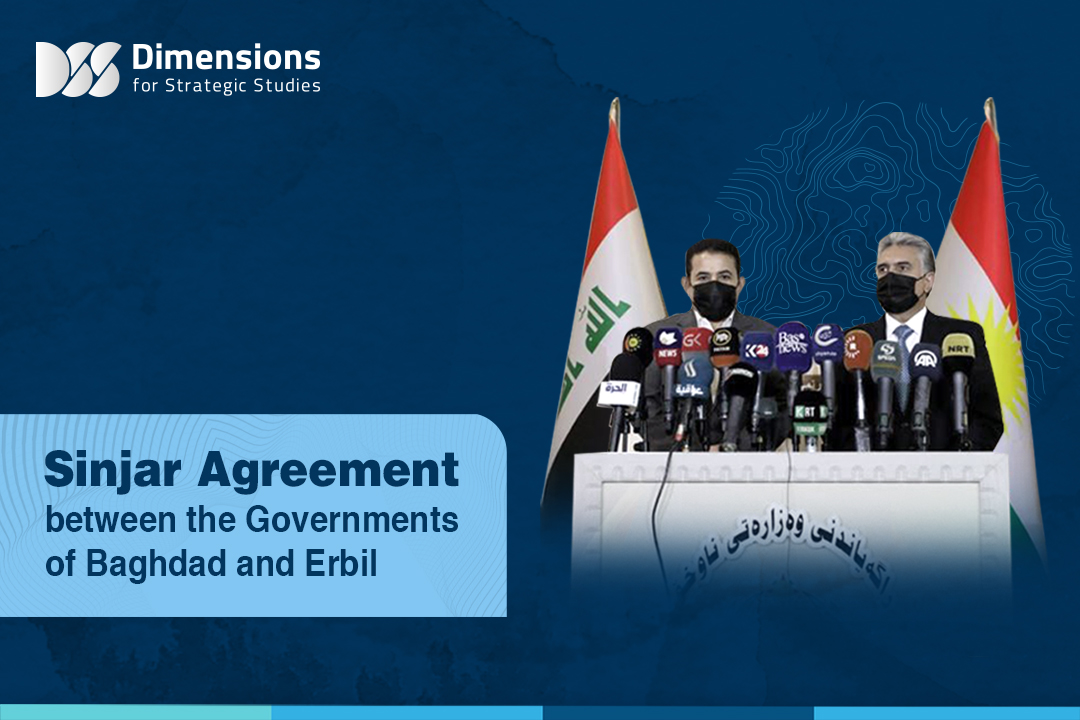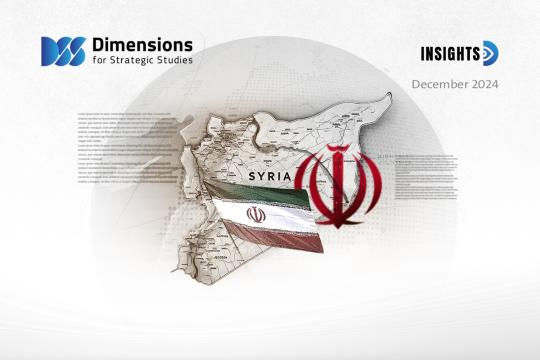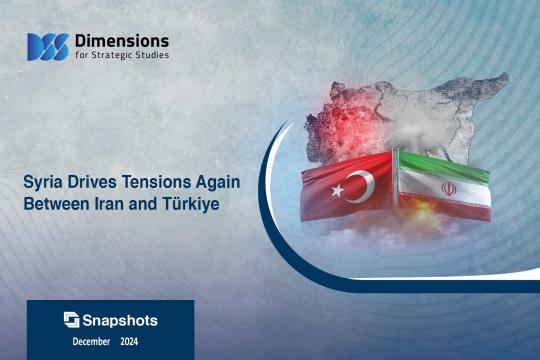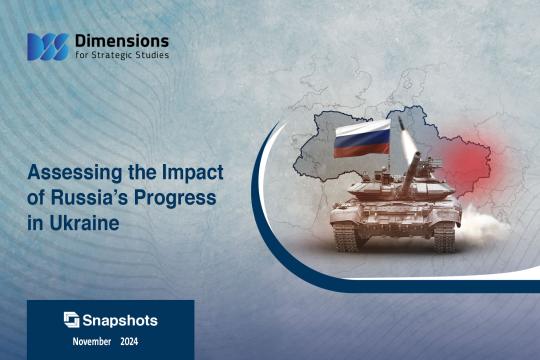
Sinjar Agreement between the Governments of Baghdad and Erbil
2020-10-2210167 view
Preamble
In early August 2014, ISIS took control of the city of Sinjar, 120 km west of Mosul, after taking control of the city of Mosul and large parts of the western and northwestern governorates of Iraq on 10 June of the same year.
The Yazidis, who constitute the vast majority of the indigenous population of the area, have been subjected to serious violations by ISIL elements, including forced displacement, field executions, women-hostage-taking, and other crimes characterized as genocide against the Yazidis.
On November 13, 2015, Kurdish Peshmerga forces, backed by PMF factions and security forces, and intensive air support from IC aircraft succeeded in retaking the city and expelling ISIS from it.
The residents of the city continue to live in a state of anxiety for fear of reprisals from the Arab tribes surrounding Sinjar, which are clans with whom they have historical differences that extend for decades, reinforced by the control of the ISIS over the region and the presence of significant numbers of members of these clans in its ranks.
At the same time, members of Arab clans in those areas live in a state of anxiety and fear of reprisals that may be launched by Yazidi armed groups affiliated with the Kurdistan Workers Party or the Popular Mobilization.
Since its liberation, efforts to reconcile Arab and Yazidi tribes, which demand that they hand over their children accused of belonging to ISIL, have failed, which is rejected by these tribes, which deny the validity of Yazidi claims.
Apart from the security forces, armed forces and factions of the Kurdistan Workers' Party (PKK), the Patriotic Union of Kurdistan (PUK), the Kurdistan Democratic Party (KDP) and factions associated with the Popular Mobilization Movement (PMF), including those of the Badr/Military Wing and others, as well as local armed factions, are all present in the area.
There are at least 15,000 armed men in the Sinjar region, including some 4,000 belonging to Yazidi armed groups, some linked to the Popular Mobilization Party and others to the Kurdistan Workers' Party, in addition to other armed groups; some of them are Syrian Kurds.
Sinjar District in Ninewa Governorate is located 120 km west of Mosul, the administrative capital of the Governorate, and about 50 km east of the Syrian border in the northeast of Hasakah Governorate.
Approximately 84,000 people live in the Sinjar area and its administrative subordinates, with Yazidis constituting the vast majority of the population of the center. Some 60,000 of them still live in the camps, while Arab tribes live in the areas around the center of the Sinjar from its three sides, east, west and south, while north to the border with Turkey there are tough mountainous areas inhabited by Kurdish and Yezidi families.
The region is not without a hidden power struggle between Iran, represented by elements of Kurdistan workers and the Popular Mobilization factions as a strategic area linking it to the West with Syria, and Turkey, which finds in the threats of the Kurdistan Workers Party and its control of important areas of the region a threat to its national security, that requires at least an intelligence presence on the ground.
First: Influential Forces in Sinjar
The multiplicity of influential forces controlling the area leads to greater complexity in managing the areas, achieving security and stability, or the return of displaced persons and reconstruction.
In March 2017, the region witnessed violent clashes between Peshmerga forces west of Kurdistan “Rojava” composed of Syrian fighters allied to the Kurdistan Democratic Party and groups affiliated with the Kurdistan Workers Party.
In October 2017, Iraqi security forces and PMF factions took control of the entire region after Kurdish Peshmerga forces were removed from the area in the wake of the fighting that followed the referendum on the independence of the region and the restoration of those forces to the city of Kirkuk and the disputed areas of the Peshmerga forces.
It is believed that the security forces, which continue to impose their presence in the area, play the smallest role in managing the security file, which is dominated by the PMF factions and factions associated with the PKK.
Second: The last agreement in Sinjar
On 10 October, the Kurdistan Regional Government, represented by Interior Minister Riper Ahmed, and the Federal Government, represented by the Deputy Head of the National Security Service, Hamid Rashid Fleih, signed an agreement to manage the situation in Sinjar.
The agreement includes three issues, administrative, security and reconstruction:
1) Administrative Issue
A new denominator shall be chosen for the Sinjar district, and other administrative posts shall be considered by the joint committee formed by the two sides.
Security Issue
The local police, national security and intelligence services are exclusively responsible for security within the Sinjar area and for the removal of all other armed groups to the outskirts.
Appointing 2,500 cadres in the Internal Security Forces in Sinjar.
Ending the presence of the PKK organization from Sinjar and its surrounding areas, and that the organization and its affiliates have no role in the region.
The preceding clauses mean that everything related to security will fall within the scope of the powers of the Federal Government's security forces away from any role for the PMF or PKK factions.
3) The Reconstruction Issue
Forming a joint committee from the federal government and the Kurdistan Regional Government for the reconstruction of Sinjar in coordination with the local administration in Nineveh.
Forming a joint field committee to follow up on the implementation of the agreement provisions.
Third: The impact of the agreement on the active parties
1. Iraqi Government
This agreement came as a result of the visit made by the Iraqi Prime Minister Mustafa al-Kazimi to the Kurdistan region last September. Therefore, there is reliance on al-Kazimi personally, who is seen as an entry point to settle the relationship between Baghdad and Erbil. Heis also seen to be helpful in limiting the influence of sub-state actors, namely the Crowd and the Workers' Party. He would also consolidate the control of the central army and police forces over broader areas.
2. Kurdistan Region
The Kurdistan Regional Government views the agreement positively and optimistically to, believing that it contributes to rebuilding and strengthening trust with the Federal Government, on condition that it is followed by further steps to address all outstanding differences.
3. United States
The US supports this agreement, given its results that increase central state control and limit Iranian influence in the north, both through the PMF and the PKK.
Kurdistan Workers' Party
The first PKK presence in Sinjar and surroundings took place on 3 August 2014 after the withdrawal of Kurdish Peshmerga forces and ISIS control of the city.
Peshmerga leaders responsible for protecting the city faced charges of "desertion" before military courts in the Kurdistan Region.
The party took advantage of the security vacuum to immediately form a number of armed groups of Yezidi volunteers, such as the Women's Protection Units in Sinjar and the Shankal Resistance Units (Sinjar), which according to official Kurdish sources receive support from the central government, that provides them with equipment, weapons and salaries (for about 1000 fighters) as a force of the Popular Mobilization.
According to Peshmerga Chief of Staff General Jamal Iminki, the central government is practically paying PKK fighters through the PMF budget.
It is estimated that the Shankal (Sinjar) Protection Forces are around 5,000 men and women combatants.
The party controls hundreds of villages (at least 658 villages) in the governorates of Kurdistan Region without having any previous presence in Nineveh Governorate before the fall of Mosul on 10 June 2014.
The PKK's alliance with the Popular Mobilization and their field coordination together in the geography of west Mosul up to the Syrian border through Sinjar constitute an added space to enhance Iranian influence in northern Iraq, threatening national security and Turkish interests in its traditional vital area in Nineveh Governorate.
The PKK believes that the Kurdistan Democratic Party in Erbil is cooperating with Turkey in its war against its fighters, and that the party as a political one will continue to be present in all parts of Kurdistan despite Ankara's attempt to undermine the role of the party by supporting the position and role of the Kurdistan Democratic Party led by Massoud Barzani.
5. Turkey
Since the signing of the Adana Agreement between the Turkish and Syrian governments in 1998, PKK fighters have moved from their camps on Syrian territory to the Mount Qandil area in the Erbil province on the border with Iran.
Turkey expects the Sinjar agreement to lead to more security cooperation between the governments of Erbil and Baghdad to weaken and eliminate the influence of the PKK and ISIS and their extensions in the region.
Turkey believes that the agreement will ease the burden of confrontation with the Kurdistan Workers' Party, which is expected to have confrontations with the security forces if it attempts to force its fighters to evacuate their positions within the city or its surroundings.
The agreement will also contribute to weakening the influence of Iran's allied PMF factions, whose presence, according to Turkey, gives Iran strength to compete for influence in northern Iraq; especially since these factions continue to threaten the Turkish presence in Iraq.
6. Democratic Self-Management of Sinjar
The Democratic Self-Administration of Sinjar, which is close to the PKK and in which a number of Yazidi political parties and bodies participate and currently assume the administration of justice, rejects the Sinjar Agreement and believes that no agreement can be accepted without the self-administration participating in the talks, and to be a major party with calls for all components of Sinjar to reject the agreement.
Contrary to the policies of the Kurdistan Democratic Party, the self-administration adopts positions in support of the Kurdistan Workers' Party, which rejected the results of the referendum on the independence of the Kurdistan region, or the holding of the referendum in its areas of control.
The territorial Government does not recognize the autonomy of Sinjar district as a violation of the Iraqi Constitution that would increase political tensions.
7. Popular Mobilization and Shia Political Blocs Allied to Iran
The Shia forces believe that the agreement is a subordination to the will of the regional government, so they have issued calls to reject the agreement because it violates the Iraqi constitution and leads to further disagreements.
Despite some non-escalatory positions of the PMF factions that rejected the agreement, the leaders of the PMF that are aware of the targeting stage to which they are exposed by the United States and the government of Mustafa al-Kazimi are not in their interest at this stage to violate the agreement adopted by the prime minister, the commander-in-chief of the armed forces, to which these factions are directly linked.
There is a fear among Shia political blocs that the Sinjar agreement will lead to the annexation of the Sinjar district in the future for the Kurdistan region, and that the agreement in fact comes within the framework of targeting the Popular Mobilization in coordination between the governments of Baghdad and Erbil, along with American cooperation.
The leaders of the Popular Mobilization Forces, who believe in the agreement as a practical prelude to the removal of their factions from the region, call for the rejection of the agreement and for a position compatible with the importance and seriousness of the agreement.
IV. Expected fate of the agreement
The agreement faces a number of challenges, the most important of which are:
The destruction of infrastructure will complicate the implementation mechanisms of the agreement, particularly with regard to the return of refugees.
There will be need for Peshmerga forces return to the area, with IC air force support, as long as there is an ISIL theat.
It is expected that if the Sinjar agreement is successful, the Iraqi government will negotiate with the provincial government to resolve the disputes over the city of Kirkuk in accordance with a similar agreement to manage the city jointly, after removing the forces of the Popular Mobilization Movement from it, as stated in the Sinjar agreement.
The agreement guarantees the removal of all other armed formations, namely the Kurdistan Workers' Party (PKK), to which the agreement explicitly referred, and the PMF factions that are not mentioned in the agreement for special accounts, limiting themselves to assigning responsibility for security within the district to "the local police, the national security and the intelligence services exclusively".
It will be important for the United States that northern Iraq be devoid of any presence of PMF factions to ensure the security of its consulate in Erbil and its forces based in the Harir/Silk base.
The agreement is likely to lead to confrontations with the Popular Mobilization there and with the Kurdistan Workers' Party (PKK), which rejects the agreement, and is not expected to accept a smooth departure from the region in response to the agreement, and the Popular Mobilization cannot lose areas of influence in the Sunni depth and on the road between Iran and Syria.





